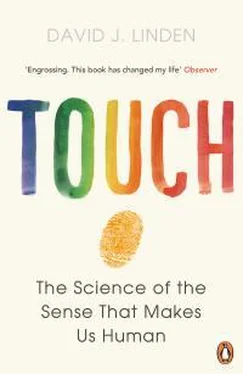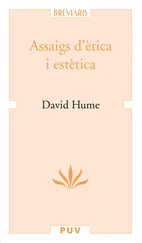
David J. Linden
TOUCH
The Science of Hand, Heart, and Mind

Contents
Prologue
ONE The Skin Is a Social Organ
TWO Pick It Up and Put It in Your Pocket
THREE The Anatomy of a Caress
FOUR Sexual Touch
FIVE Hot Chili Peppers, Cool Mint, and Vampire Bats
SIX Pain and Emotion
SEVEN The Itchy and Scratchy Show
EIGHT Illusion and Transcendence
Notes
Acknowledgments
Follow Penguin
In memory of Professor Steven Hsiao
A brilliant touch researcher
A warm friend
A man of hand, heart, and mind
If soul may look and body touch, Which is the more blest?
—W. B. Yeats, “The Lady’s Second Song,” 1938
Seeing’s believing, but feeling’s the truth.
—Thomas Fuller, Gnomologia , 1732
Prologue
Malibu, Summer 1975
We’re eight teenage campers huddled around a fire ring, late at night. Piled up like puppies, spilling over rocks and stumps and the dusty bare dirt of the Santa Monica mountains, we smell of black sage and acorns and unwashed T-shirts. With no adults in sight and the soft cover of darkness, we give voice to our innermost pubescent thoughts.
“Your turn, Sam.”
“Okay … this is for Caroline. Would you rather give an open-mouth kiss to the camp director or eat a live cockroach?”
Our voices rise in a disgusted, delighted Greek chorus, “Eeeeeeeeeeeew!”
“You’re so gross, Sam. I’m not answering that one.”
“But you have to. Those are the rules.”
“No way, you pervert.”
“You’re so prickly. I didn’t mean to hurt your feelings.”
“Yeah, right.”
“Okay, here’s a clean one. Would you rather die of cold in Antarctica or heat in the Sahara Desert?”
“I’m not allowed to bring a parka to Antarctica?”
“No, you’re naked.”
“Then I choose the desert. I want to go out with a good tan.”
Good-natured howling erupts. Caroline raises her arm and shimmies, vamping it up.
Sam smiles. “You’re so vain. And … I’ve gotta go.” Everyone knows that this is bogus. It’s obvious that he’s crazy about Caroline.
“No, you don’t, you slippery sonofabitch. Now it’s my turn. You must give up all of your senses except one. Which do you pick to save?”
“Oh, man. That’s rough. I’d keep sight. Then, at least I could get around. Uh, no, hearing—I need my music. Shit. I dunno. That would just suck.”
“Yeah, it would.”
“I’m touched by your concern.”
“Bite me.”
Later, lying in my sleeping bag and mulling over this flirtatious banter, I was puzzled. Flush with hormones, we all hungered for interpersonal touch, for kisses and caresses and more. I was typical of this group, so consumed with the idea of holding and kissing a lovely dark-haired girl named Lorelei that I could barely speak. Touch was central to our obsessions and fantasies, yet none of us ever chose to preserve it when, in the nights that followed, Caroline’s question about losing one of our senses returned in the “Would you rather …?” game. Did we simply not think the ramifications through? It’s certainly true that a bunch of horny sleep-deprived amped-up teenagers sitting around a campfire is not the ideal forum for contemplation. Or was it that we could easily imagine what it would be like to experience the loss of sight or hearing (we had all shut our eyes or plugged our ears), or even of taste or smell, yet none of us had ever actually been able to re-create the sensation of the loss of touch. Perhaps touch was woven so deeply into our sense of self that we could not truly imagine life without it. Years later when I read Lolita , I discovered that Vladimir Nabokov had, as usual, raised this very issue many years before: “It is strange that the tactile sense, which is so infinitely less precious to men than sight, becomes at critical moments our main, if not only, handle to reality.”
For Nabokov’s Humbert Humbert, touch was so infinitely precious an experience that even the merest tactile contact with his beloved Lolita aroused overwhelming passions. For all of us, the experience of touch is intrinsically emotional, and this is reflected in common expressions in English. Read the dialogue that opens this chapter and notice that phrases like “I’m touched by your concern” or “I didn’t mean to hurt your feelings ” and texture metaphors like “you’re so prickly ” or “that’s rough ” or “you slippery sonofabitch” didn’t stand out at all. We are completely accustomed to describing a wide range of human emotions, actions, and personalities in terms of our skin senses:
“I was touched by her thoughtfulness.”
“It’s a sticky situation.”
“That’s enough of that coarse language.”
“That is one hairy problem.”
“He rubs me the wrong way.”
In everyday speech, the tactile is so entangled with the emotional that when we encounter someone who is emotionally clumsy, we call him tactless : Literally, he lacks touch.
This may seem like a silly question, but it’s not: Why are emotions called feelings and not sightings or smellings ? Do touch metaphors really tell us something about the skin senses and their relationship to human cognition, or are they merely a common usage of present-day English? In fact, the constructions “I’m touched” to mean “I’m emotionally affected” and “my feelings” to mean “my tender emotions” have been in use in the language since at least the late thirteenth century. And such expressions are not unique to English, or even the Indo-European language group, as they are found in tongues as diverse as Basque and Chinese.

People who are blind or deaf from birth will for the most part develop normal bodies and brains (apart from the visual or auditory areas) and can live rich and fruitful lives. But deprive a newborn of social touch, as occurred in grossly understaffed Romanian orphanages in the 1980s and 1990s, and a disaster unfolds: Growth is slowed, compulsive rocking and other self-soothing behaviors emerge, and, if not rectified, emergent disorders of mood, cognition, and self-control can persist through adulthood. Fortunately, even a relatively minor intervention—an hour per day of touch and limb manipulation from a caregiver—can reverse this terrible course if applied early in life. Touch is not optional for human development. We have the longest childhoods of any animal—there is no other creature whose five-year-old offspring cannot live independently. If our long childhoods are not filled with touch, particularly loving, interpersonal touch, the consequences are dramatic.
The critical role of touch in early development has not always been appreciated. Child-rearing advice of the 1920s from the psychologist John B. Watson (the founder of the psychological movement called behaviorism) cautioned parents about spoiling their children with physical affection: “Let your behavior always be objective and kindly firm. Never hug and kiss them. Never let them sit on your lap. If you must, kiss them once on the forehead when they say goodnight. Shake hands with them in the morning. Give them a pat on the head if they have made an extraordinarily good job of a difficult task.” 1
While most parents today do not restrict contact with their children to an occasional pat on the head, it’s a different story outside the family. In our zeal to protect kids from sexual predators, we have promoted no-touch policies for teachers, coaches, and other supervisory adults that, while well meaning, have the inadvertent effect of adding to the touch deprivation of our children. As these kids have grown up in a touch-phobic environment and propagated these fears to their own children, our society as a whole has become further impoverished.
Читать дальше















